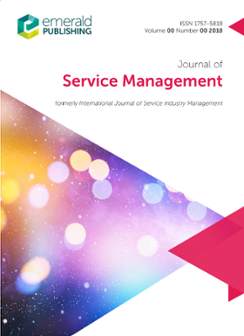Delineating transformative value creation through service communications: an integrative framework
IF 7.8
2区 管理学
Q1 MANAGEMENT
引用次数: 8
Abstract
PurposeTransformative value is a central tenet of transformative service research (TSR) because it affects individual and community well-being, quality of life and sustainability. Although transformative value plays a significant role in well-being, the literature suffers from a lack of sound interdisciplinary conceptual frameworks that delineate how transformative value is created in services throughout the service consumption process. Therefore, the purpose of this paper is to examine the nature and role of service communications during the various stages of the service consumption process to enable the creation of transformative value for people and the environment.Design/methodology/approachTo achieve the above goal, the authors integrate agenda-setting theory (media theory) combined with framing and relational dialectics (communication theories) as well as TSR.FindingsIn line with the objectives of the study, the authors propose an integrative framework named Transformative Value Creation via Service Communications (TVCSC) that explains how firms set their transformative corporate agendas through their dialectics with consumers, society and media. This transformative agenda is reflected in the marketing mix of their services (7Ps) as communicated with various means, physically and digitally (sales/frontline personnel, advertising, CSR, social media and website). Recommendations for a transformative marketing mix are provided. Furthermore, TVCSC illustrates how value is co-created in all customer–firm interactions via relationship dialectics throughout the service consumption process to result in transformative value outcomes.Research limitations/implicationsThe proposed framework identifies several research gaps and provides useful future research directions.Originality/valueThis is the first comprehensive framework that explains how transformative value is created through the various communications in services and is the outcome of value co-creation interactions of the service consumption process.通过服务通信描述变革性价值创造:一个综合框架
转型价值是转型服务研究(TSR)的核心原则,因为它影响个人和社区的福祉、生活质量和可持续性。虽然变革价值在福祉中发挥着重要作用,但文献缺乏健全的跨学科概念框架来描述在整个服务消费过程中如何在服务中创造变革价值。因此,本文的目的是研究在服务消费过程的各个阶段中服务通信的性质和作用,以便为人和环境创造变革性价值。为实现上述目标,作者将框架与关系辩证法(传播理论)相结合的议程设置理论(媒介理论)与TSR相结合。根据本研究的目标,作者提出了一个名为“通过服务传播的变革价值创造”(TVCSC)的综合框架,该框架解释了企业如何通过与消费者、社会和媒体的辩证法设定其变革企业议程。这一变革议程反映在他们的服务营销组合(7p)中,通过各种方式进行沟通,包括物理和数字(销售/一线人员、广告、企业社会责任、社交媒体和网站)。提供了变革营销组合的建议。此外,TVCSC说明了价值是如何在整个服务消费过程中通过关系辩证法在所有客户-公司互动中共同创造的,从而产生变革性的价值结果。研究局限/意义提出的框架确定了几个研究空白,并提供了有用的未来研究方向。原创性/价值这是第一个全面的框架,它解释了如何通过服务中的各种通信创造变革性价值,并且是服务消费过程的价值共同创造交互的结果。
本文章由计算机程序翻译,如有差异,请以英文原文为准。
求助全文
约1分钟内获得全文
求助全文
来源期刊

Journal of Service Management
MANAGEMENT-
CiteScore
19.20
自引率
9.40%
发文量
55
期刊介绍:
The Journal of Service Management (JOSM) centers its scope on research in service management. It disseminates papers showcasing distinctive and noteworthy contributions to service literature, serving as a communication platform for individuals in the service management field, transcending disciplines, functional areas, sectors, and nationalities. The journal publishes double-blind reviewed papers emphasizing service literature/theory and its practical applications.
 求助内容:
求助内容: 应助结果提醒方式:
应助结果提醒方式:


